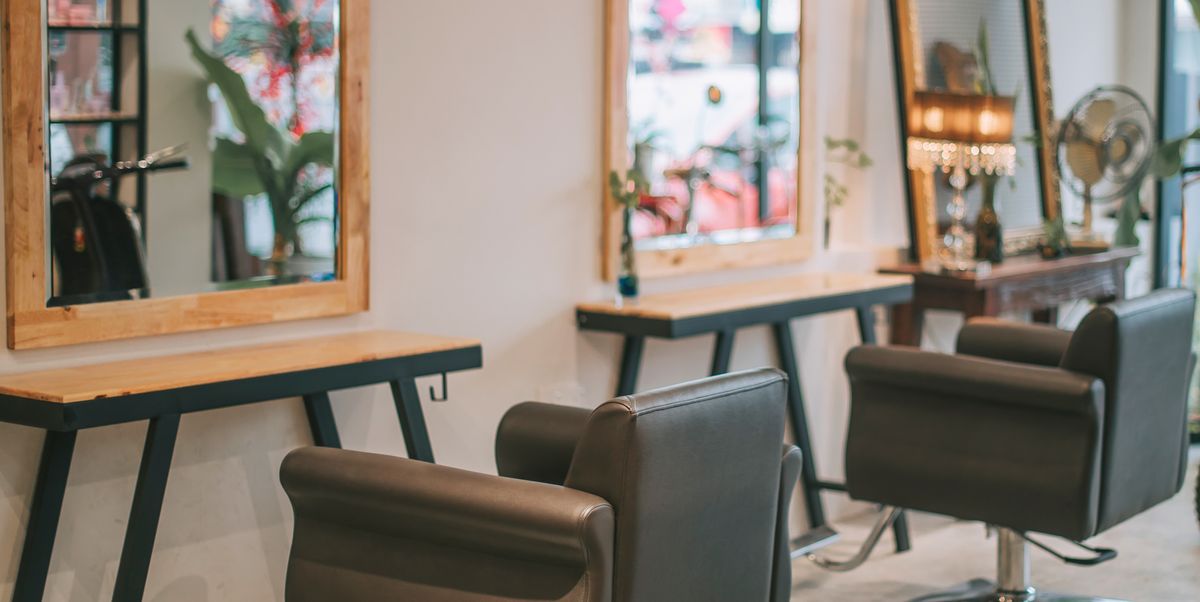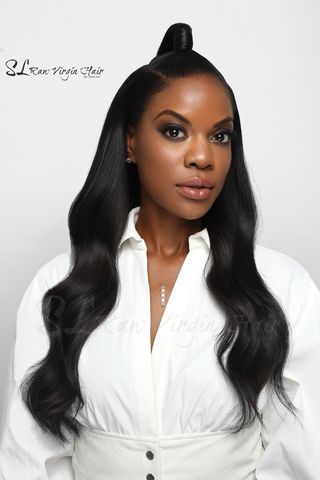Products You May Like
Frontals, closures, microlinks, and I-tips—trying to keep up with all the latest hair trends is as exhausting as actually sitting down in the salon chair for hours waiting for your desired style to be installed. For many Black women—myself included—traditional sew-ins served as our first foray into weaves before the style took a backseat to frontal/closure styles and wigs. But after a while, too much lace glue can weaken your edges (if not properly cared for), and the difference in lace quality and size make it harder for wigs to remain the get-up-and-go protective style it once was. If you’re one of the few people returning to traditional sew-ins, we don’t blame you—life was much easier with a sew-in.
Before you start shopping for hair or making an appointment, here’s a refresher on everything you should know before getting a sew-in.
What is a sew-in weave?
A sew-in “is a hair extension service consisting of small cornrow braids that are used as anchors then attached with hair wefts by use of needle and weaving thread,” says LeAna McKnight, celebrity hairstylist and founder of SL Raw Virgin Hair. You can choose between a sew-in with “leave out,” which keeps the perimeter of your hair loose to cover the tracks, or a full sew-in where all hair is tucked in.
What should you consider before getting a sew-in?
If you’re a first-timer, before heading to the salon, you might want to consider what purpose you want the sew-in to serve. Do you desire more volume or length? “Maybe you’re considering that new hair color or haircut, or you’re you want to save time in the morning on hairstyling,” says McKnight. “Determining the purpose of your sew-in weave will help decipher what kind of sew-in weave you will receive from either a partial sew-in, full head sew-in, or a closure sew-in.” This is where your professional stylist comes in. “Once you know what you’re trying to accomplish, you want to consult with a salon professional to see if your hair is strong enough to take on any mild tension to avoid any breakage or damage,” she adds.
What are the benefits of a sew-in weave?
Sew-ins are the easiest style to do when you want to switch up your look. McKnight loves the style because it protects your hair. “You get the benefit of your hair being tucked away allowing you to avoid most weather conditions and more styling freedom with heat tools,” she notes. “I like to install sew-ins as a protective style to help grow out many of my client’s hair, especially those who’ve suffered from heat damage or mothers who have suffered from telogen effluvium [post-partum hair loss].” What’s more, McKnight adds that sew-ins are great for those who frequent the gym because they help prevent being deterred by their hair sweating out.
How long should a sew-in typically last?
The installation’s longevity depends on what style you choose. McKnight suggests keeping a partial sew-in installed for up to six weeks; for a full head sew-in or one using a lace closure, up to seven weeks is fine.
What is the best way to care for a sew-in weave?
“After-care for a sew-in is fairly easy. Assuming you’re wearing 100 percent virgin human hair extensions, you’ll want to wrap or pin curl your hair extensions every night, and preserve your hair using a satin bonnet,” McKnight explains. High-maintenance styles like sew-ins with leave out require heat protectant whenever hot tools are necessary. “If heat styling is needed you’ll need to use heat protectants such as Mielle Organics thermal spray, Chi 44 iron guard, or Kenra thermal styling spray,” McKnight advises. “For those who wear curly hair extensions, I suggest braiding or twisting your hair at night time to avoid tangling and matting, just as you would care for your real hair, and using a satin bonnet or scarf.”
How do you take care of the hair underneath a weave?
Before installing a sew-in, it’s wise to give your natural hair a little extra TLC. McKnight suggests doing a pre-treatment to keep your hair moisturized and hydrated before any tension hairstyles. “By moisturizing your hair before a sew-in this will allow your hair to lock in any moisture needed while your hair is braided and during the duration of your install (moisturizing before an install will also seal hair ends to prohibit split ends),” she says. Don’t be alarmed: You can still wash your natural hair while your hair is in the protective style. “I advise that you cleanse your hair underneath once a week or once every 10 days to maintain a healthy scalp. If you are a DIY kind of person, then you can get a nozzle and fill it up with shampoo and directly apply the product onto your scalp, and gently rub and then rinse.
If you’re not comfortable doing it by yourself, you can visit a professional to take care of your hair underneath by scheduling a maintenance appointment. During this maintenance session, your salon professional will use products tailored to your specific hair type and also care for the extensions used.
What is a common misconception most people have about sew-ins?
The biggest misconception about sew-ins is the tighter the sew-in, the longer it will last— this is false. “Actually, the tighter the sew-in the more breakage and discomfort you will have. If a sew-in is installed correctly and properly maintained, you can achieve some amazing hair growth,” says McKnight.
Sew-in weaves offer as much versatility as your natural hair, if not more. Keep in mind that the pre-treatment of your natural hair is equally as important as caring for the actual weave hair while you wear the protective style. When in doubt consult with your hairstylist.
This content is created and maintained by a third party, and imported onto this page to help users provide their email addresses. You may be able to find more information about this and similar content at piano.io


